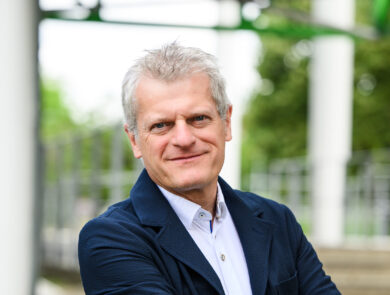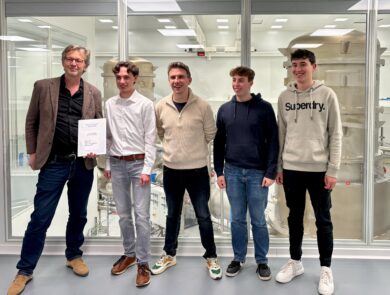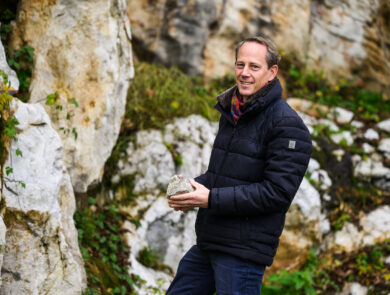“As scientists, we all want the same thing: to make progress”
At Maastricht University’s Gravitational Waves and Fundamental Physics department, researchers and students are developing new technologies for the planned Einstein Telescope. Janis Wöhler is one of them. In addition to his research job, he runs a popular physics podcast, Physik-Geplänkel [Physics Chit-Chat].

Tell us a bit about yourself?
“I’m from Hanover, in Germany. I studied physics there and I did my PhD at the Max Planck Institute for Gravitational Physics, also known as the Albert Einstein Institute. My dissertation was about reducing thermal noise in the interferometer. I’ve been a post-doctoral researcher at Maastricht University since February 2023. My research focuses on the coatings for the mirrors that are going to be used in the Einstein Telescope. It involves improving the sensitivity of the gravitational wave detector. I’m also working on continued development of the ETpathfinder, the test rig for the Einstein Telescope.”
Why did you decide on Maastricht?
“In the field of gravitational wave detection, there are only a few places in the world to conduct research. But it was actually a combination of reasons that made me decide to come to Maastricht. The research group here is part of a major scientific partnership. Here in Maastricht, I get the chance to work with researchers from LIGO/VIRGO and CERN. Apart from that, I think Maastricht is a perfect place to live – not too big and not too small. And the people I work with are great – they’re friends rather than just colleagues.”
And you’ve got your own podcast?
“Yes! I started Physik-Geplänkel in 2017 with Dennis Schmelzer, who was a colleague of mine at the Max Planck Institute. In the podcast, we chat about a wide range of physics and mathematics topics. We do that in German, because there are already a lot of English-language podcasts on the subject. The aim of the podcast is to explain complex matters in an understandable way, but without oversimplifying them. We have about 30,000 listeners each month, mostly people without a background in physics. Listeners can also send in questions for us to answer during the podcast. And making the podcast means I can brush up my own knowledge too!”

Are you looking forward to the arrival of the Einstein Telescope?
“Absolutely! It’ll enable us to visualise most of the dark matter in the universe. That will provide a lot of information about events, evolution, and any anomalies in the universe. We’ll get far more data than up to now with the current detectors, and it’ll be more precise too – which is terrific! And the local impact of a major science project like this is enormous, for example with the infrastructure and technology that’s developed. In terms of location, my preference is for this region because of its accessibility and the proximity of all the various knowledge institutions. I would be delighted to work here. As a German, I naturally hope that the German government will support the region’s bid as well.”
What else do you hope the Einstein Telescope will bring?
“It may sound a bit ideological, but I hope that when people learn more about the universe, they’ll realise that the problems here on earth are actually only minor. At least, that’s how it makes me feel. Working in an international setting makes you realise that all those conflicts and wars are just unnecessary. As scientists, you have a common goal that requires you to set aside your own self-interest. It doesn’t matter where you come from, because we all want the same thing: to make progress.”
You can listen to Janis’s podcast here (German).


